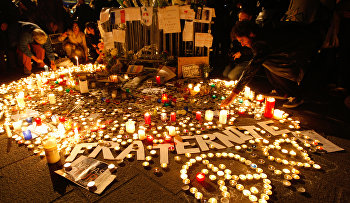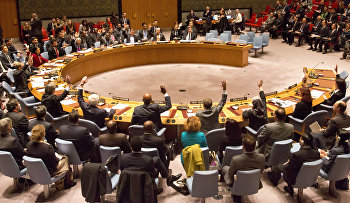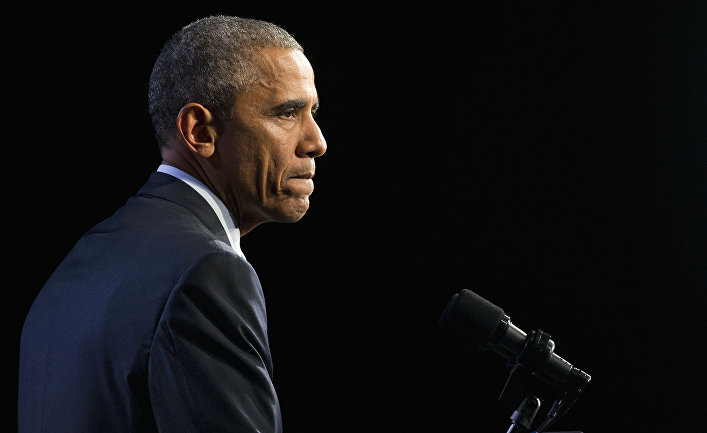French President Francois Hollande declared that France is at war. Hollande's Prime Minister Manuel Valls repeated at every opportunity: "We are at war!". A very important point that the French have emphasized — as they said — we are at war that's waging on two fronts, even if it's against the same enemy. First is the domestic front, which passes through Paris cafe terraces, football stadiums, and concert halls, as well as the asylum in Saint-Denis and the Belgian Molenbeek, where infiltrated militants hide and wait.
But the principal front is abroad, which passes through Racca, Mosul and other cities in Iraq and Syria, where these barbarians get weapons and instructions in training camps (and the West lets them flourish), learn the ropes of the new monstrous war against civilian population.
BREAKING: We want to punish culprits of #ParisAttacks & #A321 — #Putin https://t.co/5c7J3YNsXg @fhollande pic.twitter.com/fGt1Br0oyI
— Sputnik (@SputnikInt) November 26, 2015
Acknowledging that this second front is more crucial does not imply that destroying ISIL will suffice to conjure away all these more or less dormant sites of war that are ready to strike in all major cities of France and Europe.
With no doubt, because the resources and command centers of those sites are on ISIL’s territory, striking the head of the monster would deprive the terrorist group of much of their power (resources, command, etc.). Can one deal with the consequences of not fighting the caus — closing only the "branch office," not dealing with the "headquarters"? It would be equivalent to fighting cancer — removing metastases and allowing the primary tumor to grow. How then, can one avoid the obvious fact that peace in Paris can be achieved solely through war in Mosul? It's impossible to beat ISIL on the streets of Paris, where an invisible and unpredictable enemy is ready to strike again, but it's possible on the Syrian and Iraqi flatland, where it's perfectly visible and vulnerable.
Since the attacks in Paris, 1,500 people seek daily to enlist in the French Army. https://t.co/FMApRZ1tcq pic.twitter.com/Jjzt8pwqzE
— New York Times World (@nytimesworld) November 26, 2015
Today, this common-sense argument is opposed by three powerful forces. First of all, it's the Munich syndrome of those who, reversing the sequence of causality claims everywhere that the Islamists come after us because we have gone after them. This foolish and even harmful argument akin to the one of the 1930s pacifists echoes the rhetoric of the infamous murderers.

This is an old argument (20 years ago, we have heard the same story about the Serbian army, which alleged to be the third force in the world), scaring public with some incredible strength and almost invulnerable armada, which has divided Syria and Iraq, and now could drag us into another quagmire. If that were true, how is it that the Kurds (they are the only ones who are in a real fight) outfight every battle now?
How does one account for the fact that in Kirkuk and lately in Sinjar, the beheaders bolted without a fight in the face of the determination and courage of poorly armed? What has happened to the stocks of tanks and artillery, which were allegedly captured by extremists from the Iraqi army, making any form of intervention except air strikes very risky? Why didn't we see them used in Kobane or the capital of Yezidis being liberated last week? Why did they never strike at Peshmerga fighters? And why is ISIL still using the suicide trucks instead of these weapons?
The truth is that those arsenals have been destroyed, disabled or paralyzed by the coalition air forces, and ISIL today is nothing but a paper tiger. Finally, there is Barack Obama's reticence, who is being increasingly haunted by what is called the "Nobel Syndrome." Having received the Peace Prize at the beginning of his first term, the President of the most powerful state, the man without whom little would be possible and whose determination to play at least an equally important role as of Francois Holland, apparently gets up in the morning with the idea of how a real Peace Prize winner should act.

When will the US President realize that if we face an enemy who declared a war against civilization, it's time to leave behind his moral narcissism? Is he aware of the catastrophic legacy of the Nazi-like state, which was allowed to put down its roots on the chosen territory? Though it's still possible to eradicate it if the decision is made to do so. Will he hear the plea for help that a grieving France is making to its eternal ally? Will Obama lead his country once again to meet Europe's needs as it already was in 1917 and 1944?
And what has become to that young Barack Obama, who we met in Boston in 2003, when he spoke about the differences between the absurd war in Iraq vs a politically fair, morally justified war, designed not to compound evil but to curb it? These are the most painful and the most important questions nowadays.






